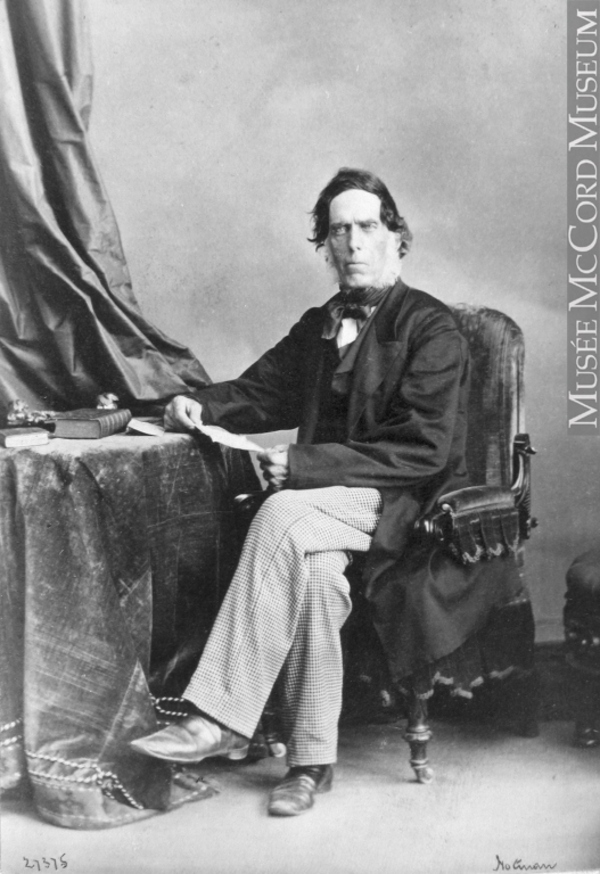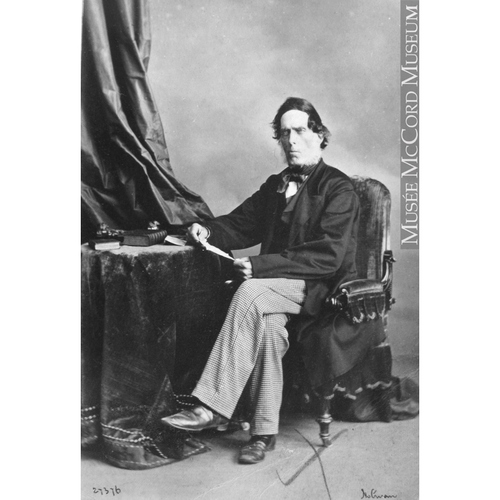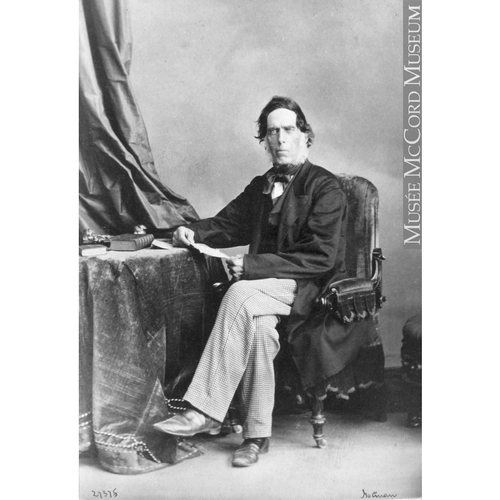
Source: Link
KING, WILLIAM, Presbyterian minister and community founder; b. 11 Nov. 1812 near Newtown-Limavady (Limavady, Northern Ireland), son of William King and Elizabeth Torrence; m. first 10 Jan. 1841 Mary Mourning Phares (d. 1846) in East Feliciana, La, and they had two children; m. secondly 15 Sept. 1853 Jemima Nicolina Baxter (d. 1887) at Buxton, Upper Canada; d. 5 Jan. 1895 in Chatham, Ont.
The son of a farmer, William King was sent in his early teens to an academy near Coleraine (Northern Ireland) run by the Reverend James Bryce, where he was educated in the classics and brought into the fold of the Presbyterian Church. At 18 he was admitted into the University of Glasgow. Upon his leaving the university in 1833, his family decided to seek its fortune in the United States. William, who had planned to attend divinity school, spent the next two years helping his family move to and settle in Ohio. In 1835 he went south, intending to teach. He settled in Jackson, La, where he established a reputation as a tutor before accepting a position as rector of Mathews Academy. He settled comfortably into Louisiana society, married the daughter of a wealthy slaveowner, and became a slaveowner himself.
By 1843 King had become disillusioned with the south in general and slavery in particular. He determined to return to Scotland to study in Edinburgh under the famous theologian Thomas Chalmers. After two years’ study there, during which time his young wife and his one surviving child died, he was licensed to preach by the Edinburgh presbytery of the Free Church of Scotland. On 17 July 1846 King, James Fettes, and William Gregg were appointed by the church’s colonial committee to serve as missionaries in Canada. After stopping off in Louisiana, where he unsuccessfully attempted to settle his affairs, King arrived in Toronto on 16 November. He began his work, preaching throughout the southwestern section of the province, but, determined to break his connection with slavery, he resigned in March 1847 and returned to Louisiana to dispose of his estate. He planned to bring his slaves to Canada and free them.
On his return to Canada in June 1848, King immediately undertook to establish a black settlement that would provide not only freedom but also land, education, and Christianity. The synod of the Presbyterian Church of Canada received his proposal with “deep interest,” and a committee that included clergymen Robert Burns* and Michael Willis* was established to assist him. After a meeting that fall with Governor Lord Elgin [Bruce*], who supported the plan, King began to investigate possible locations, finally deciding on a 9,000-acre tract in Raleigh Township near Chatham. A stock company, the Elgin Association, was formed to purchase the land; reform lawyer George Skeffington Connor* was selected as president and King was named managing director. Despite a good deal of opposition from the local white population, led by the virulent conservative Edwin Larwill of Chatham, King, who was to live in the settlement and to be closely involved in every facet of its activities, arrived at Elgin on 28 Nov. 1849. The first black settlers were the 15 slaves he had freed as well as Isaac Riley and his family, who were waiting when the others arrived with King.
The community would be administered by two distinct bodies: the Elgin Association was to handle secular affairs, while a mission, financially supported by the Presbyterian Church and later named Buxton, would attend to matters religious and educational. The land was divided into 50-acre lots that were sold at nominal prices. Each family cleared its own land, built its own cabin (to minimum specifications), and worked its own farm. Potash and pearl ash were produced and sold, and crops and livestock quickly flourished. Soon, two former slaves borrowed money from King to set up a brick factory, which was successful immediately. In March 1852 the Canada Mill and Mercantile Company was established (of its directors, only King and reformer George Brown* were white) and within two years it was operating a sawmill, a grist-mill, and a general store at Elgin. By 1853 the settlement, known both as Elgin and as Buxton, contained 130 families.
The success of Elgin, which at its peak included 300 families, was not simply economic. In 1850 a post office was opened and a church/school building was constructed. That spring the school welcomed its first students and evening classes were offered to adults. The school’s standards were high and it was soon recognized as being superior to the district school. By 1854 half of its students were white and by 1857 two additional schools had been built. To help support the mission, King, who was ordained by the Canadian church in May 1851, travelled extensively in Canada, the United States, and Britain to raise funds. Although he was a staunch Presbyterian who did missionary work outside Elgin, King helped both the Methodists and the Baptists establish congregations in the settlement.
Despite all its accomplishments, the settlement was not an unqualified success. Many leading black journalists, such as Samuel Ringgold Ward* and Mary Ann Camberton Shadd, called for the integration of blacks into white society rather than the creation of segregated settlements; King and Elgin, however, escaped the vituperation Shadd aimed at Josiah Henson* and John Scoble* of the nearby Dawn settlement and at the Refugee Home Society [see Henry Walton Bibb*] that had been patterned on the Elgin Association. Regardless of the fact that Elgin was seen by many as the model black settlement in Canada, King was nevertheless able to improve relations with the neighbouring white community only slightly. Yet the inhabitants of Elgin became well known for their industriousness, temperance, good health, and high moral standards. Many of the black settlers became citizens and, usually voting as a block, they were important in several Kent County elections. The provincial election of 1857–58 was especially significant since their votes played a key role in the defeat of Larwill, their unremitting antagonist, by Archibald McKellar, a constant supporter.
The outbreak of the American Civil War in 1861 precipitated an exodus back to the United States that sounded the death knell of the settlement: more than 70 blacks from Elgin would enlist on the Union side. The subsequent Union victory also persuaded a large number of blacks to return to the south. The settlement operated on a reduced scale throughout the 1860s, but in 1873 the Elgin Association, having accomplished its goals and reimbursed its shareholders, disbanded. King continued his various missionary activities and on 28 Dec. 1880 was “inducted into the pastoral charge of Maidstone” in the Chatham presbytery. He served there until his retirement on 10 July 1883. In the summer of 1888 he moved from Elgin to Chatham and for the next five years he preached frequently there at the First Presbyterian Church. King was bedridden in the summer of 1893 and died peacefully in January 1895.
William King is the author of History of the King family who settled in the woods near where the [vil]lage of Delta, Ohio, now stands in the year 1834, published in Delta in 1893.
NA, MG 24, J14. UCC-C, Free Church of Scotland, Colonial Committee, minutes, 1846 (mfm.). Free Church of Scotland, Home and Foreign Missionary Record (Edinburgh), 3 (1847–48): 70–72; 4 (1849–50): 122–25. [A. M. Harris], A sketch of the Buxton mission and Elgin settlement, Raleigh, Canada West (Birmingham, Eng., [1866]). PCC Acts and proc., 1881–95; Minutes of the synod (Toronto), 1848–53. Hand-book of the Presbyterian Church in Canada, 1883, ed. A. F. Kemp et al. (Ottawa, 1883), 207. W. R. Gregg, The African in North America; their welfare after freedom as effected and influenced by the life of William King . . . (Ashtabula, Ohio, [1933?]). A. S. Jamieson, William King, friend and champion of slaves (Toronto, 1925). W. H. Pease and J. H. Pease, Black Utopia: negro communal experiments in America (Madison, Wis., 1963). J. H. Silverman, Unwelcome guests: Canada West’s response to American fugitive slaves, 1800–1865 (Millwood, N.Y., 1985). Victor Ullman, Look to the north star: a life of William King (Boston and Toronto, 1969). R. W. Winks, The blacks in Canada: a history (London and New Haven, Conn., 1971). Fred Landon, “The Buxton settlement in Canada,” Journal of Negro Hist. (Washington), 3 (1918): 360–67. W. H. Pease and J. H. Pease, “Opposition to the founding of the Elgin settlement,” CHR, 38 (1957): 202–18.
Cite This Article
Jason H. Silverman, “KING, WILLIAM,” in Dictionary of Canadian Biography, vol. 12, University of Toronto/Université Laval, 2003–, accessed December 29, 2025, https://www.biographi.ca/en/bio/king_william_12E.html.
The citation above shows the format for footnotes and endnotes according to the Chicago manual of style (16th edition). Information to be used in other citation formats:
| Permalink: | https://www.biographi.ca/en/bio/king_william_12E.html |
| Author of Article: | Jason H. Silverman |
| Title of Article: | KING, WILLIAM |
| Publication Name: | Dictionary of Canadian Biography, vol. 12 |
| Publisher: | University of Toronto/Université Laval |
| Year of publication: | 1990 |
| Year of revision: | 1990 |
| Access Date: | December 29, 2025 |




